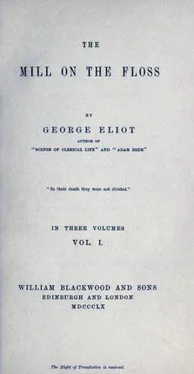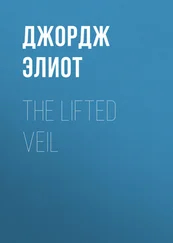"You're quite in the right of it, Tulliver," observed Mr. Riley. "Better spend an extra hundred or two on your son's education, than leave it him in your will. I know I should have tried to do so by a son of mine, if I'd had one, though, God knows, I haven't your ready money to play with, Tulliver; and I have a houseful of daughters into the bargain."
"I dare say, now, you know of a school as 'ud be just the thing for Tom," said Mr. Tulliver, not diverted from his purpose by any sympathy with Mr. Riley's deficiency of ready cash.
Mr. Riley took a pinch of snuff, and kept Mr. Tulliver in suspense by a silence that seemed deliberative, before he said,–
"I know of a very fine chance for any one that's got the necessary money and that's what you have, Tulliver. The fact is, I wouldn't recommend any friend of mine to send a boy to a regular school, if he could afford to do better. But if any one wanted his boy to get superior instruction and training, where he would be the companion of his master, and that master a first rate fellow, I know his man. I wouldn't mention the chance to everybody, because I don't think everybody would succeed in getting it, if he were to try; but I mention it to you, Tulliver, between ourselves."
The fixed inquiring glance with which Mr. Tulliver had been watching his friend's oracular face became quite eager.
"Ay, now, let's hear," he said, adjusting himself in his chair with the complacency of a person who is thought worthy of important communications.
"He's an Oxford man," said Mr. Riley, sententiously, shutting his mouth close, and looking at Mr. Tulliver to observe the effect of this stimulating information.
"What! a parson?" said Mr. Tulliver, rather doubtfully.
"Yes, and an M.A. The bishop, I understand, thinks very highly of him: why, it was the bishop who got him his present curacy."
"Ah?" said Mr. Tulliver, to whom one thing was as wonderful as another concerning these unfamiliar phenomena. "But what can he want wi' Tom, then?"
"Why, the fact is, he's fond of teaching, and wishes to keep up his studies, and a clergyman has but little opportunity for that in his parochial duties. He's willing to take one or two boys as pupils to fill up his time profitably. The boys would be quite of the family, — the finest thing in the world for them; under Stelling's eye continually."
"But do you think they'd give the poor lad twice o' pudding?" said Mrs. Tulliver, who was now in her place again. "He's such a boy for pudding as never was; an' a growing boy like that, — it's dreadful to think o' their stintin' him."
"And what money 'ud he want?" said Mr. Tulliver, whose instinct told him that the services of this admirable M.A. would bear a high price.
"Why, I know of a clergyman who asks a hundred and fifty with his youngest pupils, and he's not to be mentioned with Stelling, the man I speak of. I know, on good authority, that one of the chief people at Oxford said, Stelling might get the highest honors if he chose. But he didn't care about university honors; he's a quiet man — not noisy."
"Ah, a deal better — a deal better," said Mr. Tulliver; "but a hundred and fifty's an uncommon price. I never thought o' paying so much as that."
"A good education, let me tell you, Tulliver, — a good education is cheap at the money. But Stelling is moderate in his terms; he's not a grasping man. I've no doubt he'd take your boy at a hundred, and that's what you wouldn't get many other clergymen to do. I'll write to him about it, if you like."
Mr. Tulliver rubbed his knees, and looked at the carpet in a meditative manner.
"But belike he's a bachelor," observed Mrs. Tulliver, in the interval; "an' I've no opinion o' housekeepers. There was my brother, as is dead an' gone, had a housekeeper once, an' she took half the feathers out o' the best bed, an' packed 'em up an' sent 'em away. An' it's unknown the linen she made away with — Stott her name was. It 'ud break my heart to send Tom where there's a housekeeper, an' I hope you won't think of it, Mr. Tulliver."
"You may set your mind at rest on that score, Mrs. Tulliver," said Mr. Riley, "for Stelling is married to as nice a little woman as any man need wish for a wife. There isn't a kinder little soul in the world; I know her family well. She has very much your complexion, — light curly hair. She comes of a good Mudport family, and it's not every offer that would have been acceptable in that quarter. But Stelling's not an every-day man; rather a particular fellow as to the people he chooses to be connected with. But I think he would have no objection to take your son; I think he would not, on my representation."
"I don't know what he could have against the lad," said Mrs. Tulliver, with a slight touch of motherly indignation; "a nice fresh-skinned lad as anybody need wish to see."
"But there's one thing I'm thinking on," said Mr. Tulliver, turning his head on one side and looking at Mr. Riley, after a long perusal of the carpet. "Wouldn't a parson be almost too high-learnt to bring up a lad to be a man o' business? My notion o' the parsons was as they'd got a sort o' learning as lay mostly out o' sight. And that isn't what I want for Tom. I want him to know figures, and write like print, and see into things quick, and know what folks mean, and how to wrap things up in words as aren't actionable. It's an uncommon fine thing, that is," concluded Mr. Tulliver, shaking his head, "when you can let a man know what you think of him without paying for it."
"Oh, my dear Tulliver," said Mr. Riley, "you're quite under a mistake about the clergy; all the best schoolmasters are of the clergy. The schoolmasters who are not clergymen are a very low set of men generally."
"Ay, that Jacobs is, at the 'cademy," interposed Mr. Tulliver.
"To be sure, — men who have failed in other trades, most likely. Now, a clergyman is a gentleman by profession and education; and besides that, he has the knowledge that will ground a boy, and prepare him for entering on any career with credit. There may be some clergymen who are mere bookmen; but you may depend upon it, Stelling is not one of them, — a man that's wide awake, let me tell you. Drop him a hint, and that's enough. You talk of figures, now; you have only to say to Stelling, 'I want my son to be a thorough arithmetician,' and you may leave the rest to him."
Mr. Riley paused a moment, while Mr. Tulliver, some-what reassured as to clerical tutorship, was inwardly rehearsing to an imaginary Mr. Stelling the statement, "I want my son to know 'rethmetic."
"You see, my dear Tulliver," Mr. Riley continued, "when you get a thoroughly educated man, like Stelling, he's at no loss to take up any branch of instruction. When a workman knows the use of his tools, he can make a door as well as a window."
"Ay, that's true," said Mr. Tulliver, almost convinced now that the clergy must be the best of schoolmasters.
"Well, I'll tell you what I'll do for you," said Mr. Riley, "and I wouldn't do it for everybody. I'll see Stelling's father-in-law, or drop him a line when I get back to Mudport, to say that you wish to place your boy with his son-in-law, and I dare say Stelling will write to you, and send you his terms."
"But there's no hurry, is there?" said Mrs. Tulliver; "for I hope, Mr. Tulliver, you won't let Tom begin at his new school before Midsummer. He began at the 'cademy at the Lady-day quarter, and you see what good's come of it."
"Ay, ay, Bessy, never brew wi' bad malt upo' Michael-masday, else you'll have a poor tap," said Mr. Tulliver, winking and smiling at Mr. Riley, with the natural pride of a man who has a buxom wife conspicuously his inferior in intellect. "But it's true there's no hurry; you've hit it there, Bessy."
"It might be as well not to defer the arrangement too long," said Mr. Riley, quietly, "for Stelling may have propositions from other parties, and I know he would not take more than two or three boarders, if so many. If I were you, I think I would enter on the subject with Stelling at once: there's no necessity for sending the boy before Midsummer, but I would be on the safe side, and make sure that nobody forestalls you."
Читать дальше












